For和since在现在完成时的应用
中考英语:since与for用法
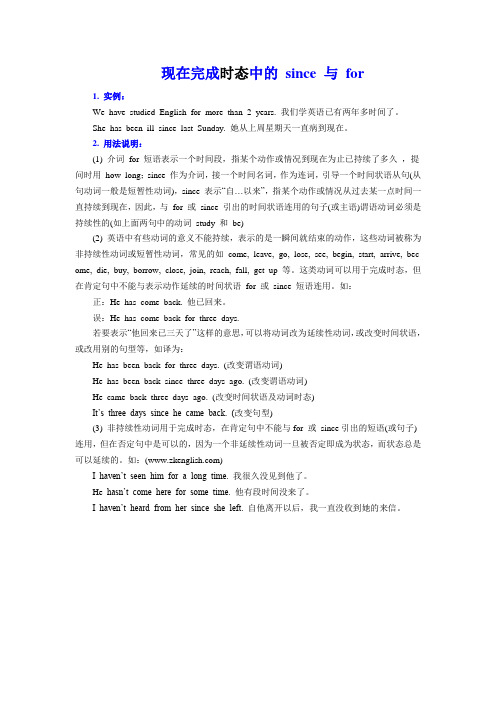
现在完成时态中的since 与for1. 实例:We have studied English for more than 2 years. 我们学英语已有两年多时间了。
She has been ill since last Sunday. 她从上周星期天一直病到现在。
2. 用法说明:(1) 介词for 短语表示一个时间段,指某个动作或情况到现在为止已持续了多久,提问时用how long;since 作为介词,接一个时间名词,作为连词,引导一个时间状语从句(从句动词一般是短暂性动词),since 表示“自…以来”,指某个动作或情况从过去某一点时间一直持续到现在,因此,与for 或since 引出的时间状语连用的句子(或主语)谓语动词必须是持续性的(如上面两句中的动词study 和be)(2) 英语中有些动词的意义不能持续,表示的是一瞬间就结束的动作,这些动词被称为非持续性动词或短暂性动词,常见的如come, leave, go, lose, see, begin, start, arrive, bec ome, die, buy, borrow, close, join, reach, fall, get up 等。
这类动词可以用于完成时态,但在肯定句中不能与表示动作延续的时间状语for 或since 短语连用。
如:正:He has come back. 他已回来。
误:He has come back for three days.若要表示“他回来已三天了”这样的意思,可以将动词改为延续性动词,或改变时间状语,或改用别的句型等,如译为:He has been back for three days. (改变谓语动词)He has been back since three days ago. (改变谓语动词)He came back three days ago. (改变时间状语及动词时态)It’s three days since he came back. (改变句型)(3) 非持续性动词用于完成时态,在肯定句中不能与for 或since引出的短语(或句子)连用,但在否定句中是可以的,因为一个非延续性动词一旦被否定即成为状态,而状态总是可以延续的。
现在完成时以及for,since的用法
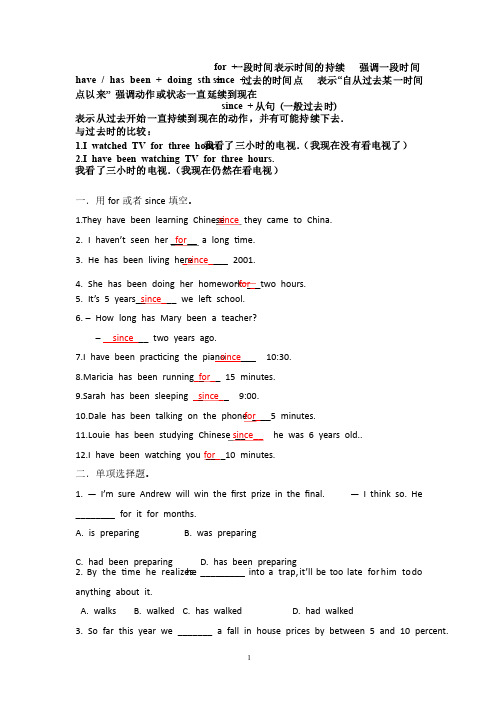
for +一段时间表示时间的持续 强调一段时间 have / has been + doing sth + since +过去的时间点 表示“自从过去某一时间 点以来” 强调动作或状态一直延续到现在 since + 从句 (一般过去时) 表示从过去开始一直持续到现在的动作,并有可能持续下去.与过去时的比较:1.I watched TV for three hours.我看了三小时的电视.(我现在没有看电视了)2.I have been watching TV for three hours. 我看了三小时的电视.(我现在仍然在看电视)一.用for 或者since 填空。
填空。
1.They have been learning Chinese since they came to China. 2. I haven’t seen her ___for __ a long me. 3. He has been living here _since____ 2001. 4. She has been doing her homework __for__two hours. 5. It’s 5 years __since___ we le school. 6. – How long has Mary been a teacher? – __since___ two years ago. 7.I have been prac cing the piano _since ___ 10:30. 8.Maricia has been running __for__ 15 minutes. 9.Sarah has been sleeping ___since__ 9:00. 10.Dale has been talking on the phone __for___5 minutes. 11.Louie has been studying Chinese __since__ he was 6 years old.. 12.I have been watching you __for__10 minutes. 二.单项选择题。
英语 现在完成时Since和for的用法

现在完成时Since和for的用法Since 和for 的用法表示过去已经开始持续到现在的动作或状态常用的时间状语有:for, since, how long, so far, these days等。
Since+过去点的时间,for+一段时间(数词+量词),此划线部分用how long提问。
一、since短语或从句表示过去的动作延续至今,since之后的时间为一点。
如:Mr. Smith has worked here since 1984. 1984年以来,史密斯先生一直在这工作。
He’s learned about 5,000 English words since he went to college. 他上大学以来大约学了五千个英语单词。
二、for短语表示动作延续多长时间,for的宾语为时间段。
如:We have known each other for twenty years. 我们认识有二十年了。
I haven’t seen her for a long time. 我好久没有见到她了。
练习:用since和for填空1) ______ two years 2) _______ two years ago 3) _______ last month4) ______ 1999 5) _______ yesterday 6) _______ 4 o’clock7) ______ 4 hours 8) _______ an hour ago 9) _______ we were children10) _____ lunch time 11) ______ she left here1. He has lived in Nanjing ________ the year before last.2. I’ve known him __________ we were children.3. Our teacher has studied Japanese _________ three years.4. She has been away from the city ___________ about ten years.5. It’s about ten years __________she left the city.2.短暂性转换延续性①arrive at/in sw. get to/reach sw. come/go/move to sw.→ be in sw./at school/at home/on the farm/be here/be there1) He got to Beijing five minutes ago.He ________ _________ _________ Beijing for _________ _________.2) I moved to the USA last year.I ________ ________ __________ the USA since __________ __________.3) I went home yesterday.I _______ ________ _________ home for _________ __________.4) They came here last week.They _________ _________ here since _________ __________.②come/go back, return → be back come/go out → be out1) He came out two years ago.He _________ __________ _________ for __________ __________.2) We return to Fuzhou yesterday.We ________ ________ _________ to Fuzhou since __________.③become → be1) I became a teacher in 2000.I ________ __________ a teacher for _________ _________.2) The river became dirty last year.The river _________ _________ dirty for _________ __________.④close → be closed open → be open1) The shop closed two hours ago.The shop ________ _________ _________ for _________ _________.2) The door opened at six in the morning.The door ________ ________ ________ for six hours.⑤get up → be up die → be deadleave sw. → be away from sw.fall asleep/get tot sleep → be asleepfinish/end → be over marry → be married1) I got up two hours ago.I ________ ________ ________ since ________ ________.2) He left Fuzhou just now.He _______ ________ ________ _________ Fuzhou for five minutes.3) My grandpa died in 2002.My grandpa _______ _______ ________for _______ ________.4) The meeting finished at six.The meeting ________ ______ ______ for six hours.5) I got to sleep two hours ago.I ________ _________ _________ since _________ __________.6) They married in 1990.They ________ _________ __________since _________.⑥start/begin to do sth. → do sth. begin → be on1) I began to teach at this school in 1995.I ____ ____ at this school since ____.2) The film began two minutes ago.The film ____ ____ ____ for ____ ____.⑦borrow → keep lose → not have buy → have put on → wearcatch/get a cold → have a cold get to know → know1) They borrowed it last week.They _________ _________ it since __________ __________.2) I bought a pen two hours ago.I _________ _________ a pen for ________ __________.3) I got to know him last year.I _________ __________ him since __________ __________.4) I put on my glasses three years ago.I __________ __________ my glasses for _________ _________.⑧have/has gone to → have been in1) He has gone to Beijing.He ____ ____ _____ Beijing for two days.⑨join the league/the Party/the army→ be a league/a Party member/a soldier→ be a membe r of the league/the Party→ be in the league/the Party/the army1) He joined the league in 2002.He ________ _________ a _________ _________ for two years.He ________ __________ a __________ ___________ the __________ for two years.He ____________ ___________ ___________ the league for two years.2) My brother joined the army two years ago.My brother __________ __________ a ___________ for ___________ ___________. My brother ___________ ___________ in ____________ ___________ for two years.3.汉译英1)这本字典我已买了三年了。
现在完成时中的since与for

现在完成时中的since与forSince 用来说明动作起始时间,for用来说明动作延续时间长度。
I have lived here for more than twenty years.I have lived here since I was born..My aunt has worked in a clinic since 1949.Some new oilfields have been opened up since 1976.I have known Xiao Li since she was a little girl.My brother has been in the Youth League for two years.I have not heard from my uncle for a long time.注意:并非有for 作为时间状语的句子都用现在完成时。
I worked here for more than twenty years.(我现在已不在这里工作。
)I have worked here for many years.(现在我仍在这里工作。
)小窍门:当现在完成时+一段时间,这一结构中,我们用下面的公式转化,很容易就能排除非延续动词在完成时中的误使。
1)(对) Tom has studied Russian for three years.= Tom began to study Russian three years ago, and is still studying it now.2)(错) Harry has got married for six years.= Harry began to get married six years ago, and is still getting married now.显然,第二句不对,它应改为 Harry got married six years ago.或 Harry has been married for six years.。
而今完成时Since和for的用法
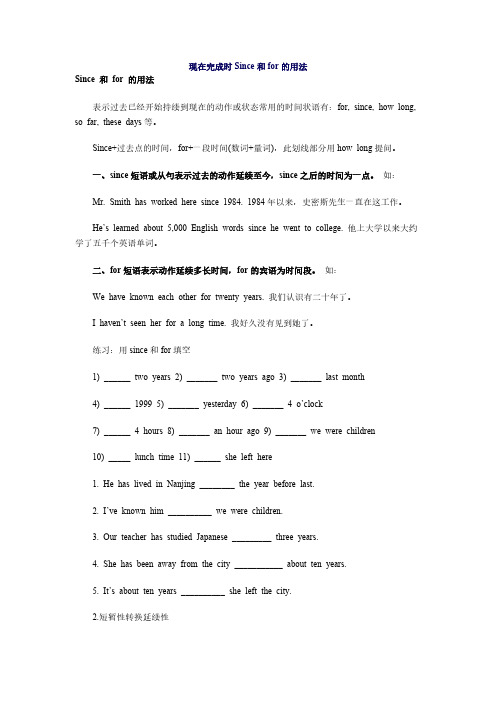
现在完成时Since和for的用法Since 和for 的用法 表示过去已经开始持续到现在的动作或状态常用的时间状语有:for, since, how long, so far, these days等。
Since+过去点的时间,for+一段时间(数词+量词),此划线部分用how long提问。
一、since短语或从句表示过去的动作延续至今,since之后的时间为一点。
如: Mr. Smith has worked here since 1984. 1984年以来,史密斯先生一直在这工作。
He’s learned about 5,000 English words since he went to college. 他上大学以来大约学了五千个英语单词。
二、for短语表示动作延续多长时间,for的宾语为时间段。
如: We have known each other for twenty years. 我们认识有二十年了。
I haven’t seen her for a long time. 我好久没有见到她了。
练习:用since和for填空 1) ______ two years 2) _______ two years ago 3) _______ last month 4) ______ 1999 5) _______ yesterday 6) _______ 4 o’clock 7) ______ 4 hours 8) _______ an hour ago 9) _______ we were children 10) _____ lunch time 11) ______ she left here 1. He has lived in Nanjing ________ the year before last. 2. I’ve known him __________ we were children. 3. Our teacher has studied Japanese _________ three years. 4. She has been away from the city ___________ about ten years. 5. It’s about ten years __________ she left the city. 2.短暂性转换延续性 ①arrive at/in sw. get to/reach sw. come/go/move to sw. →be in sw./at school/at home/on the farm/be here/be there 1) He got to Beijing five minutes ago. He ________ _________ _________ Beijing for _________ _________. 2) I moved to the USA last year. I ________ ________ __________ the USA since __________ __________. 3) I went home yesterday. I _______ ________ _________ home for _________ __________. 4) They came here last week. They _________ _________ here since _________ __________. ②come/go back, return →be back come/go out →be out 1) He came out two years ago. He _________ __________ _________ for __________ __________. 2) We return to Fuzhou yesterday. We ________ ________ _________ to Fuzhou since __________. ③become →be 1) I became a teacher in 2000. I ________ __________ a teacher for _________ _________. 2) The river became dirty last year. The river _________ _________ dirty for _________ __________. ④close →be closed open →be open 1) The shop closed two hours ago. The shop ________ _________ _________ for _________ _________. 2) The door opened at six in the morning. The door ________ ________ ________ for six hours. ⑤get up →be up die →be dead leave sw. →be away from sw. fall asleep/get tot sleep →be asleep finish/end →be over marry →be married 1) I got up two hours ago. I ________ ________ ________ since ________ ________. 2) He left Fuzhou just now. He _______ ________ ________ _________ Fuzhou for five minutes. 3) My grandpa died in 2002. My grandpa _______ _______ ________for _______ ________. 4) The meeting finished at six. The meeting ________ ______ ______ for six hours. 5) I got to sleep two hours ago. I ________ _________ _________ since _________ __________. 6) They married in 1990. They ________ _________ __________since _________. ⑥start/begin to do sth. →do sth. begin →be on 1) I began to teach at this school in 1995. I ____ ____ at this school since ____. 2) The film began two minutes ago. The film ____ ____ ____ for ____ ____. ⑦borrow →keep lose →not have buy →have put on →wear catch/get a cold →have a cold get to know →know 1) They borrowed it last week. They _________ _________ it since __________ __________. 2) I bought a pen two hours ago. I _________ _________ a pen for ________ __________. 3) I got to know him last year. I _________ __________ him since __________ __________. 4) I put on my glasses three years ago. I __________ __________ my glasses for _________ _________. ⑧have/has gone to →have been in 1) He has gone to Beijing. He ____ ____ _____ Beijing for two days. ⑨join the league/the Party/the army →be a league/a Party member/a soldier →be a member of the league/the Party →be in the league/the Party/the army 1) He joined the league in 2002. He ________ _________ a _________ _________ for two years. He ________ __________ a __________ ___________ the __________ for two years. He ____________ ___________ ___________ the league for two years. 2) My brother joined the army two years ago. My brother __________ __________ a ___________ for ___________ ___________. My brother ___________ ___________ in ____________ ___________ for two years. 3.汉译英 1)这本字典我已买了三年了。
和现在完成时连用的时间状语
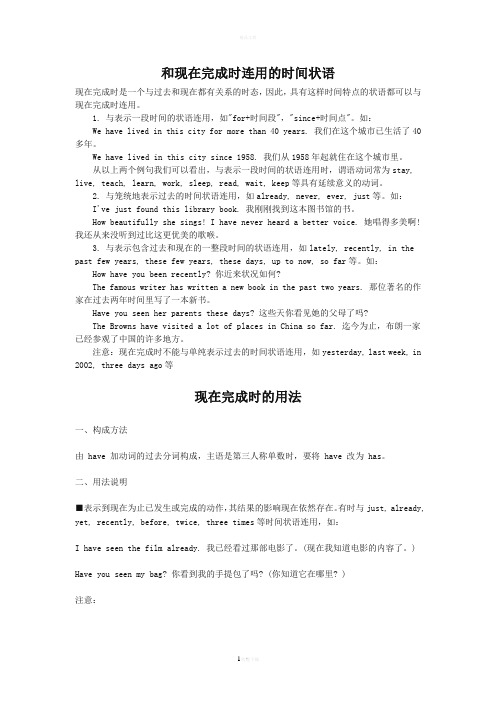
和现在完成时连用的时间状语现在完成时是一个与过去和现在都有关系的时态,因此,具有这样时间特点的状语都可以与现在完成时连用。
1. 与表示一段时间的状语连用,如"for+时间段","since+时间点"。
如:We have lived in this city for more than 40 years. 我们在这个城市已生活了40多年。
We have lived in this city since 1958. 我们从1958年起就住在这个城市里。
从以上两个例句我们可以看出,与表示一段时间的状语连用时,谓语动词常为stay, live, teach, learn, work, sleep, read, wait, keep等具有延续意义的动词。
2. 与笼统地表示过去的时间状语连用,如already, never, ever, just等。
如:I've just found this library book. 我刚刚找到这本图书馆的书。
How beautifully she sings! I have never heard a better voice. 她唱得多美啊!我还从来没听到过比这更优美的歌喉。
3. 与表示包含过去和现在的一整段时间的状语连用,如lately, recently, in the past few years, these few years, these days, up to now, so far等。
如:How have you been recently? 你近来状况如何?The famous writer has written a new book in the past two years. 那位著名的作家在过去两年时间里写了一本新书。
Have you seen her parents these days? 这些天你看见她的父母了吗?The Browns have visited a lot of places in China so far. 迄今为止,布朗一家已经参观了中国的许多地方。
for和since现在完成时的用法
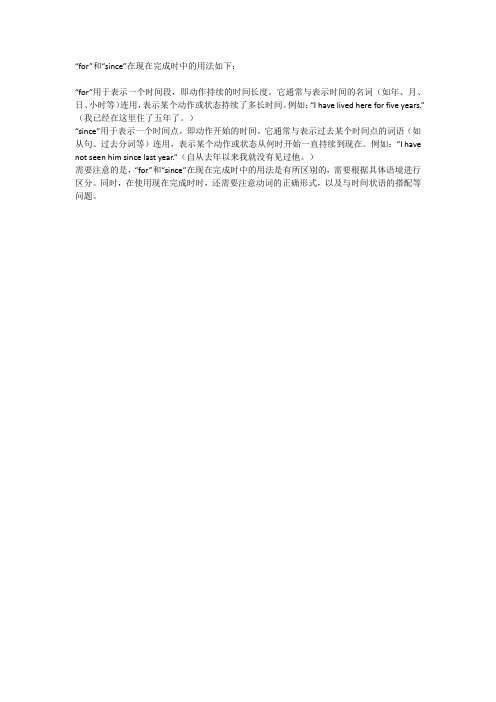
“for”和“since”在现在完成时中的用法如下:
“for”用于表示一个时间段,即动作持续的时间长度。
它通常与表示时间的名词(如年、月、日、小时等)连用,表示某个动作或状态持续了多长时间。
例如:“I have lived here for five years.”(我已经在这里住了五年了。
)
“since”用于表示一个时间点,即动作开始的时间。
它通常与表示过去某个时间点的词语(如从句、过去分词等)连用,表示某个动作或状态从何时开始一直持续到现在。
例如:“I have not seen him since last year.”(自从去年以来我就没有见过他。
)
需要注意的是,“for”和“since”在现在完成时中的用法是有所区别的,需要根据具体语境进行区分。
同时,在使用现在完成时时,还需要注意动词的正确形式,以及与时间状语的搭配等问题。
for和since现在完成时例句
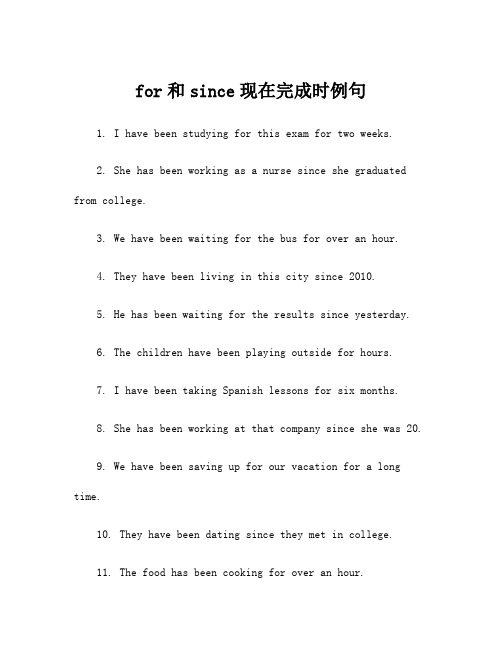
for和since现在完成时例句1. I have been studying for this exam for two weeks.2. She has been working as a nurse since she graduated from college.3. We have been waiting for the bus for over an hour.4. They have been living in this city since 2010.5. He has been waiting for the results since yesterday.6. The children have been playing outside for hours.7. I have been taking Spanish lessons for six months.8. She has been working at that company since she was 20.9. We have been saving up for our vacation for a long time.10. They have been dating since they met in college.11. The food has been cooking for over an hour.12. He has been driving for hours without a break.13. She has been feeling unwell since last week.14. They have been arguing for the past hour.15. I have been working on this project for months.16. We have been waiting for the concert to start for a while.17. The store has been closed for renovations since last month.18. He has been looking for his keys since this morning.19. She has been practicing the piano for years.20. They have been attending the same school since childhood.21. I have been saving up for a new car for a long time.22. She has been feeling tired for days.23. We have been living in this neighborhood since we got married.24. They have been planning the party for weeks.25. I have been studying English for a year.26. He has been searching for his lost dog since yesterday.27. She has been working on this project since last summer.28. They have been cooking dinner for the past hour.29. I have been waiting for my friend for over an hour.30. We have been shopping for new clothes for the trip.31. The sun has been shining for the past few days.32. She has been feeling unwell since last month.33. They have been talking for hours.34. I have been studying for my exams for weeks.35. He has been playing the guitar since he was a child.36. She has been working at the company for over a decade.37. They have been practicing for the upcoming performance.38. We have been waiting for the train for a long time.39. The rain has been falling for days.40. He has been traveling around the world since last year.41. She has been feeling better since she started her new medication.42. They have been dating for a few months.43. I have been working on this report for days.44. We have been saving up for a new house for years.45. He has been studying for his exams for weeks.46. She has been waiting for the bus since this morning.47. They have been living in the same house for years.48. I have been working at this company since I graduated.49. We have been thinking about our future for a while.50. The dog has been barking for hours.51. She has been feeling sick since last week.52. They have been playing basketball for the past hour.53. I have been writing in my journal for years.。
- 1、下载文档前请自行甄别文档内容的完整性,平台不提供额外的编辑、内容补充、找答案等附加服务。
- 2、"仅部分预览"的文档,不可在线预览部分如存在完整性等问题,可反馈申请退款(可完整预览的文档不适用该条件!)。
- 3、如文档侵犯您的权益,请联系客服反馈,我们会尽快为您处理(人工客服工作时间:9:00-18:30)。
总结
现在完成 时 for since 相同点 不同点
1.肯定句中连 For + 一段时间 用的动词应 为延续性动 1. 点时间 词。 2.否定句中动 Since 2. 一段时间+ ago 词既可为延 + 续性动词, 3. 从句(过去时) 也可为短暂 性动词。
for: (长达)
for+ 时间段
He has kept the book for 2 weeks.
选用 for和 since填空:
for a long time. 1.We haven’t seen each other ______
since 10 years 2.His father has been in the Party ______ ago. for 3.The film has been on ______ 20 minutes.
He has stayed here since 5 o’clock yesterday.
2)since+ 时间段+ ago He has stayed here since 5 hours ago. 3)since+ 从句(动词用过去时) She has taught English since he came here.
since he came to 4.Mr Green has worked here ______ China. for 5.His grandparents have been dead ______ several years.
上一页 主菜单 下一页
思考
• 我买这本书三年了。 I have bought this book for 3 years.
解析:D 我们知道题干的前半句使用了现在完成时。而前半句中“for a long time”成为解题关 键。因为在现在完成时与“for + 一段时间”连用的动词应为延续性动词。而题目中所 给的begin和finish均为短暂性动词,不能用在“for + 一段时间”的现在完成时句子中。 排除A和 C。根据题干所给的后半句,我们得知电影院里没有一个人。那 么根据常识,我们知道这部电影肯定已经结束了很长时间,故推出D为正确选项。 译文:电影已结束了很长时间,所以电影院没有一个人。
x
I have bought this book since 3 years ago.
x
区别延续性动词和短暂性动词
• 短暂性动词:从“开始发生”到 “结束/终 止”,几乎同时或在极短的时间里(如 ‘几秒钟/几分钟内’)就完成了“开始— 结束”的过程。如:come,close等。 • 延续性动词:表能持续很长时间的某个动 作或状态的动词。如:stand,teach等。 • 我买这本书三年了。 I have had this book for 3 years. √ I have had this book since 3 years ago.
For和since在现在完成时中 的用法
区别点时间和段时间
• • • • • • 5:30 5 years 3 minutes 2002 May 5 2 months
点时间 段时间 段时间 点时间
点时间
段时间
since , for 的用法:
since: (自…以来)
1)since+过去的时间点
Take notes
• 【答案及解释】D。首先观察题中所给的4个选项,以及 前半句中关键词“for + 一段时间”,我们知道第一空使 用了现在完成时,而根据B所说的话我们得知电影并没有 放映很长时间,所以A所说的话应为否定句。故排除A和 C。殊不知,现在完成时的否定句中,“for + 一段时间” 也可与短暂性动词连用。同理,在现在完成时的否定句中, since+过去的某一点,since+一段时间+ago,以及since 引导的从句也可以与短暂性动词连用。故答案D也正确。 (可以理解为这个动作在段时间中从未发生过,故完成时 的否定句里短暂性动作和延续性动作都可以与for和since 连用)译文:A:电影并没有开始很长时间。B:我同意你的 看法。我们能够开心的看完剩余部分。我们没必要那么赶。
√
I haven’t bought the bike for a year.
●但在否定句中,短暂性动词可以与时间段连用。
√
•• •ThFra bibliotek film _______ for a long time, so there is no one in the cinema. A. has begun B. has been on C. has finished D. has been over
reach--be (in/at) buy-- have
close-be closed
open--be open return-- be back
borrow-- keep
finish-- be over
marry--be married
become-be
思考
• 我买这辆自行车还不到一年。
I haven’t had the bike for a year.
• 【答案及解释】B。首先观察题中所给的4个选项,以及前 半句中解题关键的“since”。我们知道第一空使用了现在 完成时,而现在完成时中since引导的从句动词时态应用 一般过去式,故排除A和 C。此外,现在完成时与“since 从句”连用,主句的动词应为延续性动词,而题目中所给 的begin和finish均为短暂性动词,不能在有“since从句” 的现在完成时句子中使用。所以答案只能选择B。再根据 题干所给的后半句,我们得知她错过了电影的开头部分, 与B选项所要表达的意思一致,故推出B为正确选项。译 文:自从玛丽来到电影院,电影已经放映了,所以她错过 了电影的开头部分。
• A: The film _______ for a long time。 • B: I agree with you. We can be happy to enjoy the rest part, so we don’t need to hurry up. • A. has been on • B. didn’t begin • C. has begun • D. hasn’t begun
• The film _______ since Mary ______ the cinema, so she misses the beginning of the film. • A. has begun; comes into • B. has been on; came into • C. has finished; came into • D. has been over; came into
※ 短暂性动词与 延续动词间的转 换
leave-- be away (from) join-- be in/be a/an… come/go (to) be -- (in/at) start/begin-be on arrive (at/in)-be (in/at) die-- be dead
get (to)-- be (in/at)
